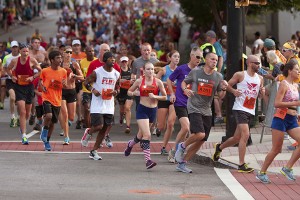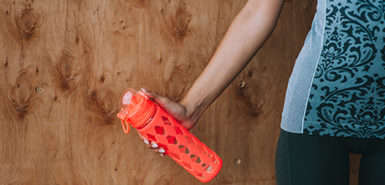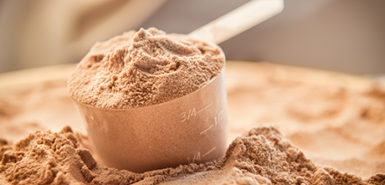
If you’re a competitive runner, or even a weekend enthusiast, then you probably know all about GU.
GU is short for GU Energy, a popular brand of sport gels that are helping endurance runners earn better-than-average results.
Kelly Gmazel, a marathon runner and a marketing consultant at Spectrum Health, swears by the stuff, even though it doesn’t sound very appetizing.
“GU has a thick consistency similar to frosting, and anyone who takes it usually chases it with water,” she said. “It comes in a variety of flavors, so runners try different flavors before a big race.”
GU typically comes in 100-calorie packets, and some cross country runners literally tape the gel to their bodies so they can quickly ingest it as needed during a competition, said Phillip Adler, manager for Spectrum Health Medical Group’s sports medicine program.
Tips for race day
Spectrum Health marketing consultant Kelly Gmazel, who completed her first Chicago Marathon last fall, offers these tips for newer runners:
- Have a driver. It’s easier if you don’t have to worry about parking on the big race day. It’s something a runner doesn’t need to think about while preparing.
- Give yourself plenty of time. It’s not good to show up feeling rushed. It wears on you and can mess with your endurance and results.
- Pick a meet-up spot for your cheering section. Don’t wait until after the race, but set a spot to meet up with friends and family before you begin. It’ll be one less worry.
- Don’t start in a sprint. Even the 5K isn’t short, but for longer distances, pick up your pace as you feel your stride and comfort. Darting out too fast will crush your last few miles.
- Test your fuel plan. If you’re running a 25K, you’ll likely need at least two nutrition items to take along, but this can be very individualized. Test this out in your training regime.
- Hydrate. Drink water during the race. You’re better off having to make a pit stop while running than getting dehydrated.
- Enjoy every moment. You trained hard. Listen to the people cheer. Enjoy the sights and sounds of the race. Wave to family and friends. And don’t be afraid to pat yourself on the back for a race well run.
- Run for you. Set a goal, but don’t get too disheartened if you don’t meet it. Work for a personal record, and run your own race, not the person’s race who is next to you.
Some runners eat gummy bears and fruit snacks, Adler said, but these energy foods use gelatins or wax and contain high fructose corn syrup, which is not the kind of energy you need in a pinch. GU is a little lighter on the stomach than food such as a protein bar, bread or meal bar.
“These products provide the body with small amounts of readily available calories that can then be used as energy as needed,” he said. “They are easy for the body to process, and are different from a caffeine jolt, and more likely to maintain solid energy levels.”
This makes GU attractive for marathon runners and other athletes that need a mid-game pick-me-ups, Adler said.
One recent study found that even novice marathoners improved their race times after using the sports gels.
Don’t hit the wall
While GU is quite popular, Gmazel said some runners opt for beans, chomps, or tablets to add to water. These options consist of essentially the same nutrients you get from GU, just in a different form. The point is to keep your tank full, said Jill Graybill, community nutrition educator with Spectrum Health’s Healthier Communities.
“Most ‘high octane fuel’ will be comprised of carbs, sodium and potassium, whether it is from gel, beans, blocks or food,” she said. “Runners need 30 to 60 grams of carbs after running 75 minutes, but don’t wait that long or your tank might be empty and you could hit a wall.”
If you’re going for more than 75 minutes, you should start taking carb supplements after 30 minutes of activity, Graybill said. “That carb source needs to be fast absorbing to keep the body fueled, and your electrolytes (sodium and potassium) also need to be replenished.”
Practice makes perfect
Is GU safe? While too much of even a good thing is usually bad, neither Adler nor Graybill see any major issues with using GU and other supplements as instructed.
Graybill suggested giving the products a test run before a big race, instead of trying them for the first time during a marathon. “And make sure to try different flavors and test taking them at different times,” she advised.
Runners should use their training time to learn what works best for them, leaving fewer surprises for race day, she said. She pointed to a great list of foods from Runner’s World for those who prefer the old school method of eating for specific nutrients instead of taking supplements.
And Adler stressed that these products are no substitute for hydration, and need to be used while drinking plenty of water.
“To maintain energy levels while exercising, it is important to stay hydrated, something that is 10 times more important than using energy supplements,” he said.
Is it all in your head?
And let’s not forget the psychological benefits of using GU and other supplements, Adler said.
“If people feel they have more energy, they will believe that they can run faster or do more work in that period of time,” he said. “It’s hard to measure the psychological impact of a product, but I do believe there is a mental component to these products as well.”
 /a>
/a>
 /a>
/a>
 /a>
/a>